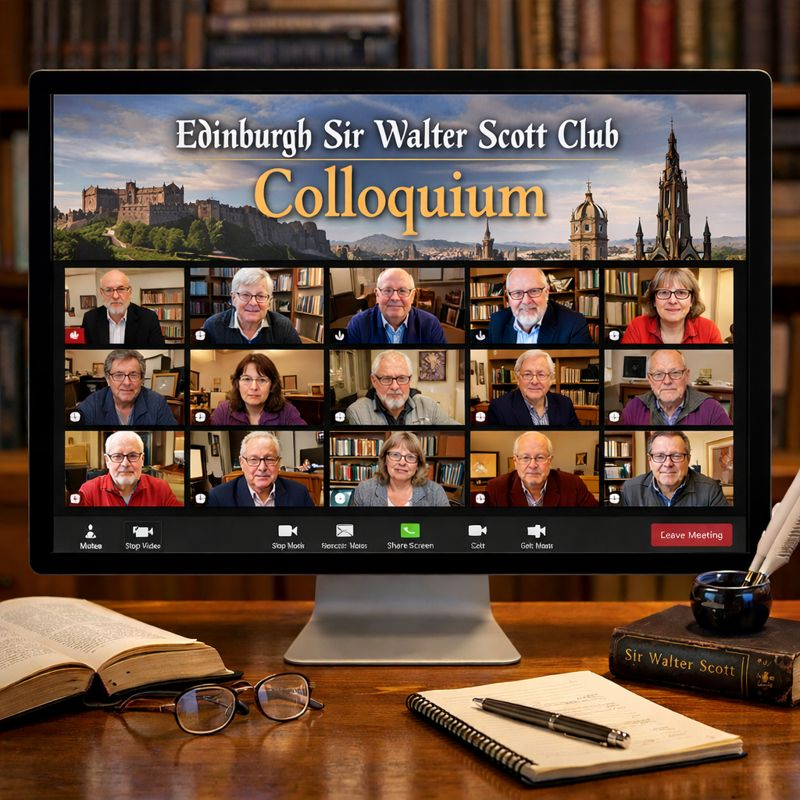Colloquium on Rob Roy
Alasdair Hutton and Professor David Hewitt
Saturday 20th June 2009
Summary of the Talks:
The Colloquium on Rob Roy features two speakers: Alasdair Hutton and Professor David Hewitt, offering insights into the novel by Sir Walter Scott. Here's a summary of the key points discussed:
Background on Rob Roy:
- Context of Writing: Scott began writing Rob Roy in August 1817, shortly after visiting Rob Roy MacGregor's cave. He faced challenges during the writing due to health issues, particularly biliary colic. Despite this, he finished the novel by December 1817, and it was published by the end of the month. It was an immediate success, with the first edition selling out quickly.
- Critical Reception: The novel received positive reviews overall, with a notable critique from The Edinburgh Review regarding Diana Vernon's character. More recent analysis, such as that by Allan Massie, suggests that Rob Roy champions commerce over the feudal honour embodied by Rob Roy himself, with Baillie Nicol Jarvie representing a more modern, civil society.
Alasdair Hutton's Perspective:
- Modernity of the Novel: Hutton describes Rob Roy as a surprisingly modern novel, filled with intrigue, adventure, and romance. He finds it gripping, though he points out that the protagonist, Francis Osbaldistone, isn't a particularly memorable character, being too virtuous and perfect. In contrast, Baillie Nicol Jarvie stands out as a strong and relatable character. The villain, Rashleigh Osbaldistone, is less vividly drawn, but his evil nature enhances the story's tension.
- Rob Roy as a Noble Savage: Hutton also reflects on Scott’s portrayal of Rob Roy as a figure who moves between worlds, guided by a personal moral code that stands in contrast to the genteel society. He highlights the moral clarity of Helen McGregor’s decision to execute a traitor, which reflects a harsh but clear justice in her society.
Professor David Hewitt's Analysis:
- Narrative Structure: Hewitt points out that Rob Roy is Scott's only first-person narrative, told by Frank Osbaldistone, who reflects on past events. The story spans several years, and Frank's narration is influenced by his experiences, especially his evolving relationship with his father. As he recounts the events of 1715, Frank’s reflection on his own life becomes central to the narrative.
- Economic and Social Themes: Hewitt delves into the economic undercurrents in the novel, highlighting how Scott links Protestantism, liberty, and economic prosperity. The character of Baillie Nicol Jarvie exemplifies this integration of individual wealth and social responsibility. Scott also explores how financial desperation drives characters like Rob Roy and Sir Hildebrand to rebellion.
- Frank's Growth: Frank Osbaldistone evolves both intellectually and personally as he reflects on the events of 1715. He begins as a supporter of the modern British state but comes to recognize that Rob Roy and others like him were victims of a system that marginalized them. Frank’s journey is both personal (reconciliation with his father) and ideological (understanding the costs of modernity).
Interesting Points to Mention:
- Narrative Technique: The use of a first-person narrator is significant because it allows Scott to explore how personal experience influences one’s perspective, particularly in Frank’s reflective recounting of past events.
- Economic Insights: The novel subtly addresses the tensions between traditional ways of life (represented by Rob Roy) and the modern, capitalist society emerging in the 18th century. This is reflected in characters' financial struggles and their relationship with the state.
- Moral Codes and Justice: Scott’s exploration of different moral systems is a key theme, particularly in the contrast between the Highland code of honour and the values of mainstream society.
- Rob Roy as a Tragic Hero: Rob Roy is portrayed as a tragic figure who is caught between an old way of life and the pressures of a modern, capitalist society, offering a poignant critique of economic development’s impact on traditional cultures.
These observations reveal Rob Roy as more than just an adventure story, offering deep reflections on identity, morality, and the tensions between tradition and progress.
Download the [transcript] or read the [bulletin]

Download the [transcript] or read the [bulletin]


